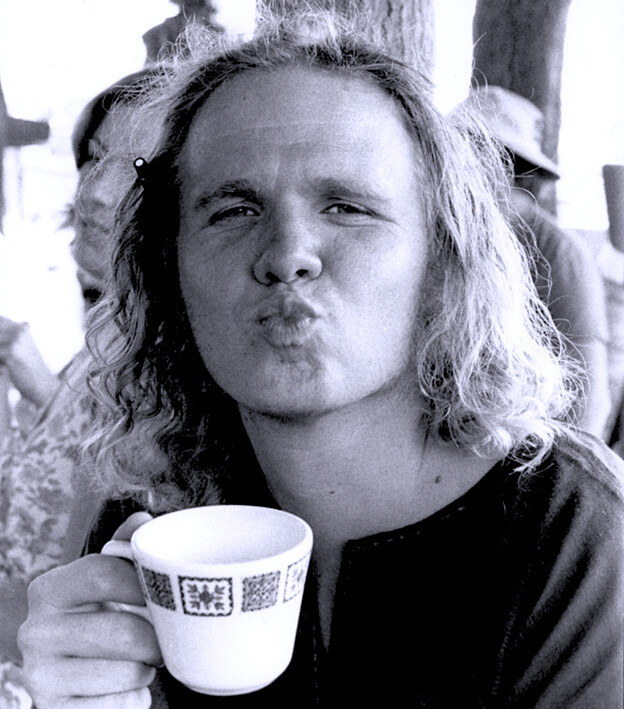
Adore adore (PoemTalk #159)
bpNichol, 'Dada Lama' and 'A Small Song That Is His'

Al Filreis and PoemTalk engineer and editor Zach Carduner took to our virtual Wexler Studio and convened Tracie Morris, Douglas Kearney, and Derek Beaulieu, from Brooklyn, Minneapolis, and Banff, respectively, to talk about two sound-poem/performance pieces by poet, editor, fiction writer, sound poet, and publisher Barrie Philip Nichol, best known as bpNichol. The two pieces we discuss are “Dada Lama” of 1966 (recorded in 1969) and “A Small Song That Is His” of 1974. “Dada Lama” was published by Cavan McCarthy in an edition of three hundred copies and is available from bpNichol.ca as a PDF. A recording was included in Journeying and the Returns (Coach House Press, 1967). “A Small Song That Is His” has long been part of PennSound’s extensive bpNichol page. It has been segmented from a rare sixty-minute cassette published in 1971 by High Barnet Company in Toronto. “A Small Song” is performed on that tape along with “Love Poem for Gertrude Stein,” “Beast (for Hugo Ball),” and other bpNichol favorites. The text of “A Small Song” later appeared in Love: A Book of Remembances, published by Talonbooks in 1974 (and is reproduced below).
Derek notes of “Dada Lama” that it’s an early piece in which bpNichol’s clearly working through his  influences. At that point the sound poem was “really new to the Canadian conversation.” It echoes Hugo Ball and Tristan Tzara. By the time you get to “A Small Song” there’s more confidence in bpNichol’s grasp of the sound poem, such that he can begin to “come up with a poetics of the letter.” “And poems are not made of feelings,” Derek reminds us. “Poems are made of letters.” Doug sees — in the alphabetically ordered “DEF” of “A Small Song” — that bpNichol is assigning “an acoustic image” to the typographical image of each letter. You have, Doug observes, a visual pun in the opening (indeed, an opening of a field) made with the “O.” That having been established, we then soon have the “H” of a leg, a table: “H” with its high vertical ascender becomes that table with legs. Doug senses that we begin to be able to map the sky, the lake, as emanations from the alphabet, in a sense reversing the conventional idea of what happens to letters as letters when they are deployed to signify things, whereupon their initial fundamental role as makers of meaning is typically repressed or forgotten or, at least, taken for granted. A bpNichol sound poem can undo that repression. Tracie interprets “Dada Lama” as a lullaby, and hears the vowels as an opening and an openness, a calming opacity, while the consonants then bring in a limitation. In the openness of the sound in the opening of the poem, Tracie hears a very particular cultural pointing and significance, an aesthetic stake in the ground being put down, in the “Canadian-ness” of the sound of the verbs. And this, argues Tracie, enables us to see bpNichol in the act of “establishing his place.”
influences. At that point the sound poem was “really new to the Canadian conversation.” It echoes Hugo Ball and Tristan Tzara. By the time you get to “A Small Song” there’s more confidence in bpNichol’s grasp of the sound poem, such that he can begin to “come up with a poetics of the letter.” “And poems are not made of feelings,” Derek reminds us. “Poems are made of letters.” Doug sees — in the alphabetically ordered “DEF” of “A Small Song” — that bpNichol is assigning “an acoustic image” to the typographical image of each letter. You have, Doug observes, a visual pun in the opening (indeed, an opening of a field) made with the “O.” That having been established, we then soon have the “H” of a leg, a table: “H” with its high vertical ascender becomes that table with legs. Doug senses that we begin to be able to map the sky, the lake, as emanations from the alphabet, in a sense reversing the conventional idea of what happens to letters as letters when they are deployed to signify things, whereupon their initial fundamental role as makers of meaning is typically repressed or forgotten or, at least, taken for granted. A bpNichol sound poem can undo that repression. Tracie interprets “Dada Lama” as a lullaby, and hears the vowels as an opening and an openness, a calming opacity, while the consonants then bring in a limitation. In the openness of the sound in the opening of the poem, Tracie hears a very particular cultural pointing and significance, an aesthetic stake in the ground being put down, in the “Canadian-ness” of the sound of the verbs. And this, argues Tracie, enables us to see bpNichol in the act of “establishing his place.”
As noted, this episode was directed, engineered, and then edited by Zach Carduner. Al Filreis is PoemTalk’s founder and producer, 159 episodes and months after its debut in 2007. PoemTalk is grateful to our partners at the Poetry Foundation, and to Nathan and Elizabeth Leight for their generous support.
A Small Song That Is His
adore adore
adore adore
an opening an o
an h a leg a table or
a window & a w
a sky that is d
a lake that is f
e
[...]
me
you or me or
i h & d
m e
e f d
o